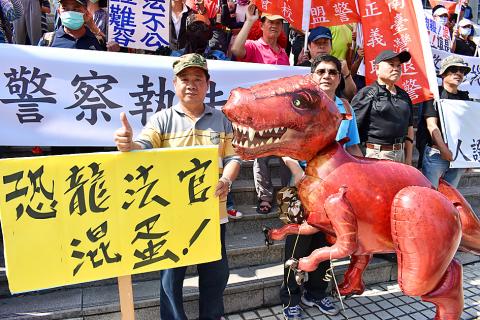Bad attitude, rashness, bias and incompetence are the main issues with Taiwan’s so-called “dinosaur judges,” a nickname bestowed for their being out of touch with society, Judicial Reform Foundation chairman Lin Yung-sung (林永頌) said.
The most common problem with “dinosaur judges” is their attitude, Lin said, citing his years of observing court proceedings and dealing with appeals.
Some judges speak loudly or harshly, while others mock or make fun of trial participants, or fail to give them a chance to speak, he said.

Photo: Chang Jui-chen, Taipei Times
A judge in Taoyuan told a defendant, on penalty of jail time, not to speak unless giving a confession, he said.
Next is rashness, Lin said.
Rash judges are overconfident and believe that reading the case before court begins is unnecessary, he said, adding that people can tell that the judge did not prepare and has no knowledge of the case.
These judges delay the trial by not asking crucial questions, he added.
Another common problem is judicial bias, Lin said.
Judges should be objective, gradually forming an inner conviction about the case as each court session leads up to their deliberation, but some have preconceptions due to their environment, personal or religious beliefs, or external pressures, he said.
Biased judges often interrupt litigants after one or two sessions in court, or even refute their claims, he said, adding that these judges have already made up their minds before hearing the case.
Some judges are incompetent — they are simply incapable of reviewing cases, Lin said.
Incompetent judges are usually not harsh, rash, or biased, rather they tend to be hardworking, but misinterpret cases and are unable to render judgements, he said.
They cannot provide a clear rationale for decisions and are clearly unqualified, he added.
Judges mostly learn from more experienced colleagues or other members on their panel, he said, adding that they have few opportunities to observe other courts or broaden their horizons.
The Judicial Yuan, to identify and get rid of so-called “dinosaur judges,” should study the complaints filed by litigants, he added.

Alain Robert, known as the "French Spider-Man," praised Alex Honnold as exceptionally well-prepared after the US climber completed a free solo ascent of Taipei 101 yesterday. Robert said Honnold's ascent of the 508m-tall skyscraper in just more than one-and-a-half hours without using safety ropes or equipment was a remarkable achievement. "This is my life," he said in an interview conducted in French, adding that he liked the feeling of being "on the edge of danger." The 63-year-old Frenchman climbed Taipei 101 using ropes in December 2004, taking about four hours to reach the top. On a one-to-10 scale of difficulty, Robert said Taipei 101

Nipah virus infection is to be officially listed as a category 5 notifiable infectious disease in Taiwan in March, while clinical treatment guidelines are being formulated, the Centers for Disease Control (CDC) said yesterday. With Nipah infections being reported in other countries and considering its relatively high fatality rate, the centers on Jan. 16 announced that it would be listed as a notifiable infectious disease to bolster the nation’s systematic early warning system and increase public awareness, the CDC said. Bangladesh reported four fatal cases last year in separate districts, with three linked to raw date palm sap consumption, CDC Epidemic Intelligence

US climber Alex Honnold left Taiwan this morning a day after completing a free-solo ascent of Taipei 101, a feat that drew cheers from onlookers and gained widespread international attention. Honnold yesterday scaled the 101-story skyscraper without a rope or safety harness. The climb — the highest urban free-solo ascent ever attempted — took just more than 90 minutes and was streamed live on Netflix. It was covered by major international news outlets including CNN, the New York Times, the Guardian and the Wall Street Journal. As Honnold prepared to leave Taiwan today, he attracted a crowd when he and his wife, Sanni,

Taiwanese and US defense groups are collaborating to introduce deployable, semi-autonomous manufacturing systems for drones and components in a boost to the nation’s supply chain resilience. Taiwan’s G-Tech Optroelectronics Corp subsidiary GTOC and the US’ Aerkomm Inc on Friday announced an agreement with fellow US-based Firestorm Lab to adopt the latter’s xCell, a technology featuring 3D printers fitted in 6.1m container units. The systems enable aerial platforms and parts to be produced in high volumes from dispersed nodes capable of rapid redeployment, to minimize the risk of enemy strikes and to meet field requirements, they said. Firestorm chief technology officer Ian Muceus said